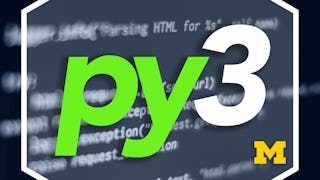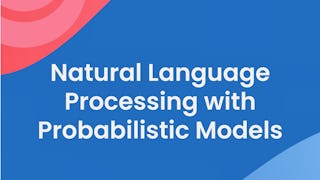Updated in May 2025.
This course now features Coursera Coach! A smarter way to learn with interactive, real-time conversations that help you test your knowledge, challenge assumptions, and deepen your understanding as you progress through the course. This course will introduce you to key techniques in Natural Language Processing (NLP) and teach you how to implement probability models using Python. You will understand the foundational concepts of NLP, such as spam detection, sentiment analysis, text summarization, and topic modeling. By the end of the course, you will be able to confidently apply probability-based algorithms to real-world text data and solve NLP problems using Python. In the first section, you will start with spam detection, where you'll learn the basics of Naive Bayes and its application for identifying spam emails. You'll also dive into metrics like ROC, AUC, and F1 scores to assess model performance. Next, you’ll explore sentiment analysis and learn the intuition behind logistic regression, focusing on both binary and multiclass problems. You'll implement sentiment analysis techniques in Python, working on exercises that enhance your practical skills. The course continues with text summarization, where you’ll learn various methods, including the use of vectors and the TextRank algorithm. As you progress, you will implement both beginner and advanced approaches for text summarization in Python, reinforcing your understanding through hands-on coding exercises. The final section introduces topic modeling, where you'll work with Latent Dirichlet Allocation (LDA) and Non-Negative Matrix Factorization (NMF) to uncover topics in large datasets. You’ll gain deeper insights into these techniques with advanced Python implementations. This course is ideal for individuals who are interested in learning NLP and probability models in Python. You will need a basic understanding of Python programming and some background in machine learning. The course is suitable for both beginners and intermediate learners who want to enhance their knowledge of NLP.




 enthalten
enthalten













